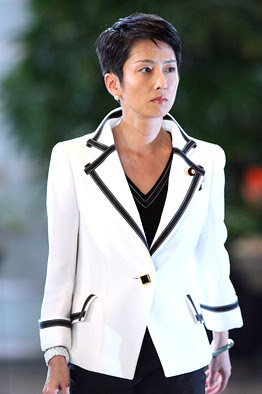'What's wrong with being #2?' in Adbusters magazine

“what’s wrong with being the world’s no. 2?”
So said Renhō, the single-monikered and, for a Japanese politician, unusually single-minded 42-year-old female member of the ruling Democratic Party of Japan, tapped by Prime Minister Naoto Kan this summer to serve as minister of administrative reform (aka, chief budget-slasher). Renhō uttered the question during a debate late last year on financing a next-generation supercomputer project powerful enough to compete with the US, but her plaintive question resonated far beyond the walls of Japan’s Upper House chamber.
By the middle of this year, as the stack of urgent reports concerning Japan’s stagnant economy, political paralyses, fading competitiveness, so-called Galápagos syndrome isolationism, emerging social strains amid widening income gaps, diminished labor pools and a rapidly aging population piled high, Renhō’s rhetorical query seemed to cut to the core of Japan’s mounting troubles.
She was promptly criticized, most notably by old guard politicos like former Trade Minister Takeo Hiranuma when he offhandedly reminded voters that Renhō “[was] not originally Japanese,” playing the hoary hand of nationalism by referring to her naturalization in 1985.
Born to a Taiwanese father and Japanese mother, Renhō is a former pinup model and TV news presenter who maintains a very active Twitter account, YouTube channel and Ustream internet video streaming site. She favors short haircuts and lean white jackets over her almost entirely middle-aged male colleagues’ bland barbering and suits of charcoal gray. A Wall Street Journal profile of Renhō this summer called her “the ruling party’s most recognizable face,” a significant label even in a country that has gone through five prime ministers in four years.
In other words: Most Japanese needed no reminder of who she is.
And then it happened. In the middle of Japan’s month-long summer holidays, during which local papers reported that some companies were curtailing vacations or cutting them altogether to stay competitive, the international media made it official: Japan suddenly became No. 2, at least in Asia, and No. 3 in the rest of the world. China had made sure and quick work of it.

Photo by Yasutaka Kojima
Reaction in Japan’s domestic media was mute to nonexistent. Some questioned the various methods used to calculate GDP figures, while other outlets simply ignored the story. The implied answer to Renhō’s question, which resonated deeply enough that she published a book titled Do We Have to Be No. 1? in June, has grown glaringly obvious: What’s wrong with being No. 2 is that you have to adapt to it. [more here @Adbusters magazine]

.jpg)